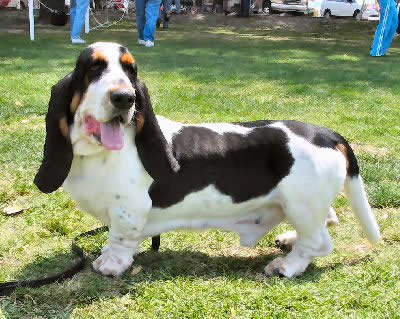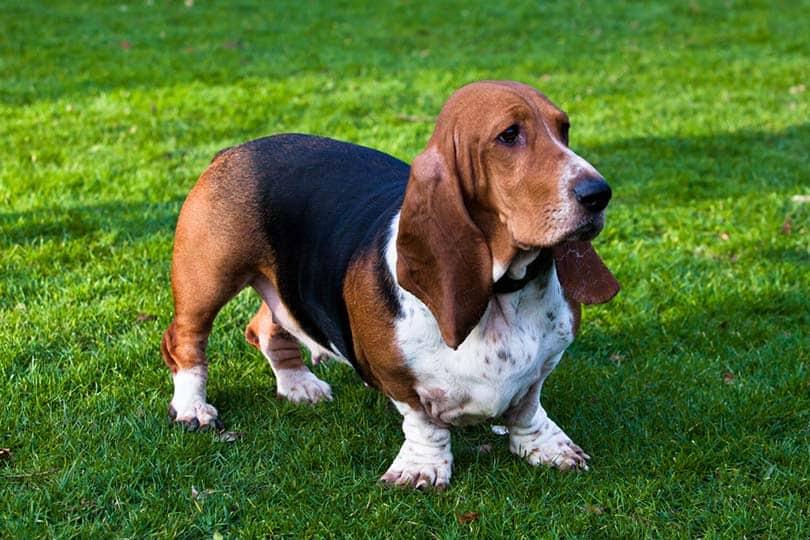
The short stocky Basset Hound, originally bred to hunt rabbits, is a quiet dog in the house but likes to be active when it gets outside.
Basset Hounds make great pets. They are friendly, gentle, and well behaved. They are very affectionate and respond well to consistent training. Basset Hounds are prone to hip, knee, and elbow problems, so it is important to consider this when choosing one. Hereditary disorders include Von Willebrand disease and hyperthyroidism.
- Kingdom: Animalia
- Phylum: Chordata
- Class: Mammalia
- Order: Carnivora
- Family: Canidae
- Genus: Canis
- Species: lupus familiaris
Common Name(s)
Breed Type
The Basset Hound is a small scent hound. The Basset Hound was originally bred to hunt rabbits, and they are still used for that purpose today.
Background
Basset Hounds originated in France, and are a descendent of the St. Hubert’s Hound, which was similar to the Bloodhound. They were favored by rabbit hunters because of their short stature and excellent sense of smell. In the early 1900s, efforts were undertaken to develop a hunting line and a companion line of these dogs. Today’s standard is a combination of both.
Description
Basset Hounds are usually white in color, with black and tan, red, honey, or lemon markings. They have long, droopy ears, large heads, long muzzles, and loose skin. Males average 12-15 inches long and 50-60 pounds, while females are 11-14 inches long and 45-60 pounds.
Care and Feeding
Basset Hounds thrive on foods containing poultry, lamb, wheat and corn. They are prone to bloat, so it is advisable to feed them three small meals each day.
They shed constantly, so regular brushing is important. They should be shampooed as needed, and their toenails need regular trimming. Basset Hound breeders often have their dog’s dewclaws removed at around 3 days of age.
Annual checkups are recommended, and vaccinations should be administered as follows:
- 6-8 weeks: Distemper, Leptospirosis, Hepatitis, Parainfluenza, Parvo, and Corona virus (DHLPPC)
- 10-12 weeks: Second DHLPPC
- 14-16 weeks: Third DHLPPC and rabies
- Annually: DHLPPC and rabies booster
If you keep your Basset Hound indoors, regular vacuuming will be necessary. These dogs also have a distinct scent, so frequent cleaning of carpet and furniture is a must.
Housing Your Dog
Basset Hounds can be kept indoors or outdoors. They are inactive when kept inside, but enjoy running when outdoors. This breed makes a good apartment dog, but it needs regular exercise.
Social Behaviors
Basset Hounds are very easygoing, and they can get along with just about anyone. They also do nicely with other animals, and they are great with kids.
Handling and Training
The Basset Hound can be slow to housebreak and stubborn. They are good at learning obedience and tricks, however, as long as you train them gently and consistently.
Activities
Basset Hounds are not excessively active, but they do need plenty of exercise. Long daily walks are necessary, and they also need to play often. If they have a place to play outdoors, they will do so with little encouragement.
Breeding/Reproduction
When looking for a mate for your Basset Hound, it is important to check bloodlines for Von Willebrand disease and reproductive problems. This breed often has large litters, sometimes producing 15 or more puppies.
Common Health Problems
Basset Hounds are prone to joint problems, and this can be exacerbated by their tendency to jump up and down. Regular checkups can help ensure that their joints stay healthy. Other concerns include possible paralysis due to their body structure. This is somewhat preventable by making sure your dog maintains a healthy weight.
Availability
Basset Hounds are fairly easy to find, with breeders in most areas. They may also be found in pet stores. Prices average $500-$700.
References
“Basset Hound“, Wikipedia, Copyright 2008
“Basset Hound“, Dog Breed Info Center, Copyright 1998-2008
Cusick, William D., “”What to Feed a Basset Hound“, Referenced online, 2008
Welton, Michelle, “Basset Hounds: What’s Good About ‘Em? What’s Bad About ‘Em?“, Copyright 2000-2008
“Basset Hound Puppies for Sale“, Copyright PuppyFind.com, LLC, Referenced online, 2008
Featured Image Credit: Ewa Studio, Shutterstock
